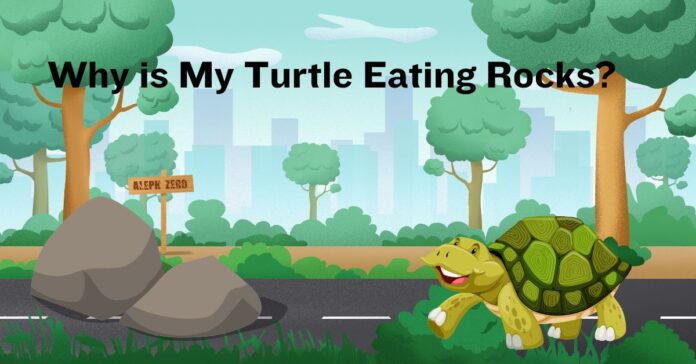Having a pet turtle can be a rewarding experience, but sometimes they exhibit unusual behavior that leaves their owners concerned. One such behavior is when a turtle starts eating rocks. In this article, we will delve into the reasons behind this behavior, potential risks involved, and provide some guidance on how to address this issue. Read on to gain insights into your turtle’s well-being and how to ensure a safe and healthy environment for your shelled companion.
Understanding the Natural Behaviors of Turtles:
Turtles are fascinating creatures with unique habits and behaviors. In the wild, they spend a significant amount of time exploring their environment, foraging for food, and searching for minerals. Eating rocks can be a natural behavior for some turtle species, but it is essential to differentiate between normal rock-seeking behavior and excessive consumption.
Nutritional Deficiencies and Dietary Imbalance:
One of the primary reasons turtles eat rocks is the presence of nutritional deficiencies or dietary imbalances. Turtles require a diverse diet that includes a combination of vegetables, fruits, and protein sources such as insects or commercial turtle pellets. Inadequate nutrition can drive turtles to seek out alternative sources of essential minerals, leading them to ingest rocks.
Enclosure Setup and Environmental Enrichment:
The setup of your turtle’s enclosure plays a crucial role in preventing rock consumption. Lack of proper environmental enrichment, such as basking spots, hiding places, and suitable substrates, can lead to boredom and stress in turtles. When turtles become stressed, they may exhibit abnormal behaviors like eating rocks. Ensure your turtle’s enclosure is well-designed, mimicking their natural habitat, to reduce the chances of rock ingestion.
Misidentification and Mistaken Consumption:
Sometimes, turtles mistake rocks for food items due to their appearance or similarity to objects they typically consume. If your turtle’s diet includes small prey animals like fish or insects, they might inadvertently ingest rocks while attempting to capture their prey. It is crucial to provide proper feeding strategies, using appropriate dishes or platforms to avoid confusion and accidental ingestion of rocks.
Health Issues and Veterinary Care:
Persistent rock-eating behavior can be indicative of underlying health issues in turtles. Gastrointestinal problems, parasites, or other illnesses may contribute to this behavior. If your turtle consistently exhibits a strong inclination towards eating rocks, it is advisable to seek veterinary care. A veterinarian with experience in reptile medicine can conduct a thorough examination to identify any potential health concerns and provide appropriate treatment.
Potential Risks and Consequences:
While small rocks may pass through a turtle’s digestive system without causing harm, larger or jagged rocks pose serious risks. Ingesting such rocks can lead to intestinal blockages, internal injuries, or even choking hazards. These conditions can be life-threatening for turtles and require immediate veterinary attention. It is crucial to address this behavior promptly to mitigate potential risks.
Addressing the Issue:
To prevent your turtle from eating rocks, here are some helpful steps to take:
Review and adjust your turtle’s diet to ensure it meets their nutritional requirements.
Provide a well-designed enclosure with appropriate environmental enrichment to reduce stress and boredom.
Monitor your turtle closely to observe any signs of health issues, and seek veterinary care if necessary.
Regularly clean and inspect your turtle’s enclosure to remove any small rocks or debris that may be mistaken for food.
Consider using substrates that are less likely to be ingested, such as large river rocks or smooth gravel.
Conclusion:
If you notice your turtle eating rocks, it is crucial to understand the underlying reasons for this behavior and take appropriate action. By addressing nutritional deficiencies, ensuring proper environmental enrichment, and seeking veterinary care when needed, you can safeguard your turtle’s health and well-being. Remember, a happy and healthy turtle depends on a responsible and knowledgeable owner.
FAQs
Q1. Is it normal for turtles to eat rocks?
A:Yes, some turtles exhibit natural behaviors of seeking out and consuming rocks. However, excessive rock consumption can be a cause for concern and may indicate nutritional deficiencies, dietary imbalances, or stress. It is important to monitor your turtle’s behavior and address any excessive rock-eating habits.
Q2. Can eating rocks harm my turtle?
A:Yes, eating rocks can pose serious risks to turtles. Small rocks may pass through their digestive system, but larger or jagged rocks can lead to intestinal blockages, internal injuries, or choking hazards. These conditions can be life-threatening and require immediate veterinary attention. It is crucial to prevent your turtle from ingesting rocks whenever possible.
Q3. How can I prevent my turtle from eating rocks?
A:To prevent your turtle from eating rocks, ensure they have a well-balanced diet that meets their nutritional requirements. Provide a properly designed enclosure with environmental enrichment, including suitable substrates and hiding spots. Regularly clean and inspect the enclosure to remove any small rocks or debris that could be mistaken for food. Monitoring your turtle’s behavior and addressing any health issues promptly can also help prevent rock consumption.
Q4. When should I seek veterinary care for my turtle’s rock-eating behavior?
A:If your turtle consistently exhibits a strong inclination towards eating rocks, it is advisable to seek veterinary care. Additionally, if your turtle shows signs of distress, such as reduced appetite, lethargy, vomiting, or difficulty passing stools, immediate veterinary attention is necessary. A reptile veterinarian can conduct a thorough examination and provide appropriate treatment if needed.


